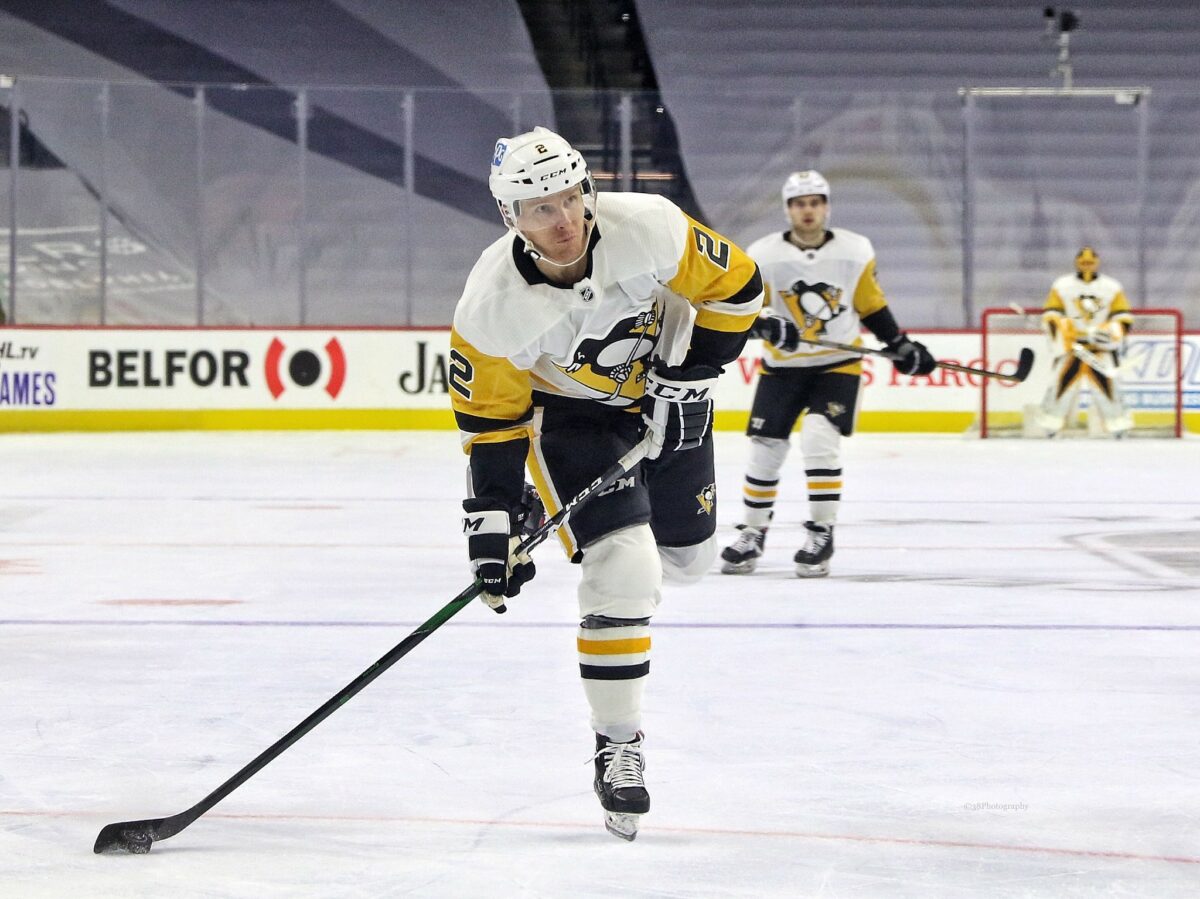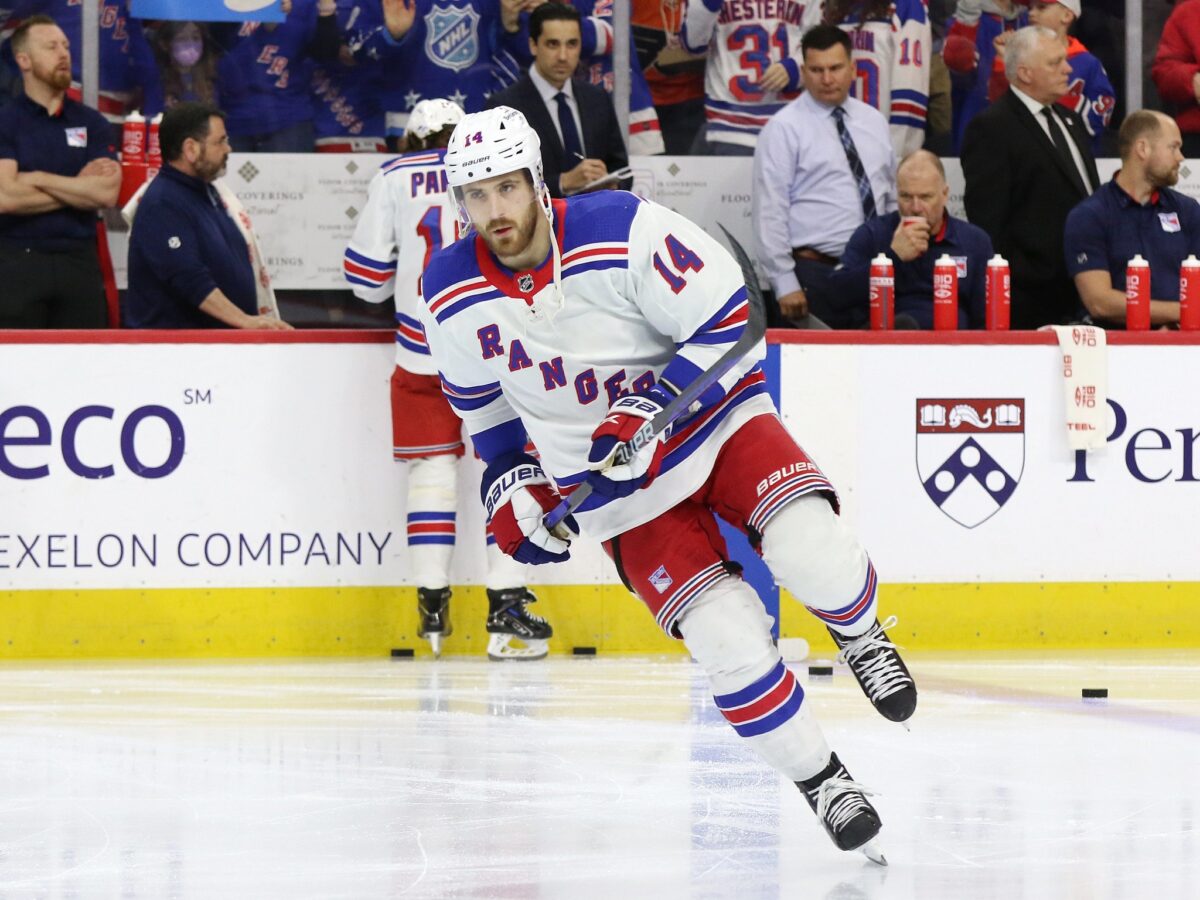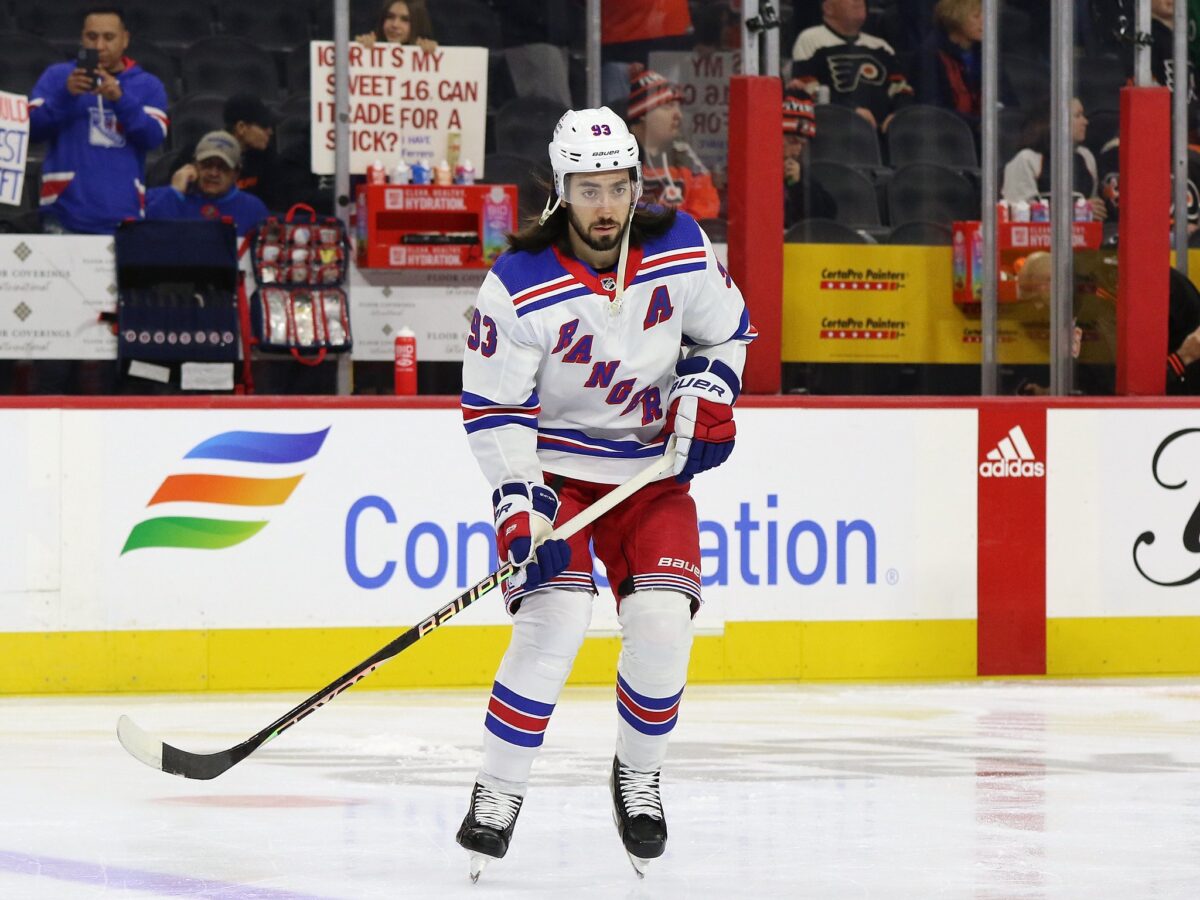The New York Rangers had a very active 2024 Trade Deadline. From acquiring Alex Wennberg to bringing in Chad Ruhwedel, as well as making a minor swap with the Minnesota Wild involving Turner Elson and Nic Petan, the Rangers did a lot in hopes of getting better and making a push for a Stanley Cup. In this Rangers Roundtable, we spoke to Rangers writers Lucas Standel and Sam Henes and got their responses to a few questions.
How Did the Rangers Do at the Deadline?
Lucas: The Rangers did the best they could given the circumstances. They were able to get the third-line center they wanted in Wennberg and they didn’t have to give up a first-round pick like the Edmonton Oilers, Vancouver Canucks or Winnipeg Jets did when they traded for centers like Adam Henrique and Sean Monahan. They also got a good depth defenseman in Ruhwedel for a cheap price, who has lots of regular season and playoff experience and can easily slot into the third defensive pair if he needs to.

The big issue many fans had with the deadline was that they could not get Jake Guentzel. He was instead traded to the Hurricanes, who are right behind the Rangers in the Metropolitan Division. Fans have to realize that the Canes had a deeper prospect pool and could trade away the prospects that they did and still not hurt themselves going forward. Trading for Guentzel would have hurt the Rangers much more in the future because of what they were going to have to give up. They also didn’t want to have to pay the high price to get Frank Vatrano from the Anaheim Ducks. So they settled with getting Jack Roslovic from the Columbus Blue Jackets, which was a good move as he looked great in his first game as a Ranger.
Related: New York Rangers 2024 Trade Deadline Recap
Sam: Reminiscent of his approach during the 2022 Trade Deadline, general manager (GM) Chris Drury opted for enhancing the team’s depth over chasing marquee names. By acquiring players like Roslovic and Wennberg, he mirrored his previous acquisitions of Vatrano and Copp, focusing on bolstering the supporting cast rather than adding headline stars. Ruhwedel’s acquisition serves a similar purpose to bringing in Justin Braun, strengthening the defensive line without splurging. Furthermore, although not acquired through a trade, the addition of Matt Rempe is evocative of Tyler Motte’s role, marking an astute enhancement to the squad’s composition.
This strategy underscores a week of prudent and effective management by Drury, emphasizing the importance of role players in the team’s dynamics without overspending. His moves have not only improved the roster but have done so in a cost-effective manner. His strategic maneuvers have elevated an already formidable roster, yet the pivotal transformation for the Rangers will hinge on Mika Zibanejad’s resurgence in five-on-five play. His ability to return to peak performance will have to be the most significant addition to the team post-trade deadline.

Jesse: The Rangers did what they had to, with what they had available to them, to get better. I am a big fan of all of their additions and I think they have done enough to be able to say they gave it their all in hopes of going all-in and having a good chance at winning a Stanley Cup this season.
How Confident Are You in the Rangers’ Chances at Making a Deep Playoff Run?
Sam: Confident, but cautious. The unpredictability of hockey is what makes the sport thrilling, and the Rangers’ recent postseason experiences perfectly encapsulate this. Two years ago, they defied expectations by reaching the Eastern Conference Final, while last season, despite being pegged as Stanley Cup contenders, faced an early exit in the first round. The key to altering this pattern and securing a deep playoff run lies in the performance of their core players.
The spotlight is on Artemi Panarin, Zibanejad, Vincent Trocheck, Alexis Lafreniere, Adam Fox, Chris Kreider, and Igor Shesterkin to elevate their game. Their contributions—or lack thereof—last playoffs, ranging from Panarin’s two points to Lafreniere’s absence on the score sheet, highlight the critical need for these players to perform at their peak. While Fox, Kreider, and Shesterkin were great in the playoffs last year, it was not enough and it won’t be enough again this year without the rest of the top six showing up.

Lucas: With the way the team is playing now, I have the most confidence that they can make a deep run in the playoffs this spring. Shesterkin is back to playing at the top of his game and when he is, the Rangers are a tough team to beat and he has proved that he can play at a top level in the playoffs the past two seasons. Panarin is still playing at a Hart Trophy level and will likely break the 100-point mark for the first time in his career this season. The one question that still needs to be answered is when will Zibanejad finally break through. The month of March is usually when he turns his game up, so hopefully that will happen sooner rather than later because if the Rangers want to win the Stanley Cup, they need their number-one center to start producing like he has in the past.
Jesse: I am super confident, but am also cautious. It’s worrisome that teams like the Vegas Golden Knights and Hurricanes were more active at the trade deadline and made some bigger acquisitions, but the Rangers should still be able to make a deep postseason run this season. As mentioned by both Lucas and Sam, the team will need their star players to continue stepping up if they want any hope of being a Stanley Cup champion.
Would You Have Made Any Other Moves at the Deadline?
Lucas: While it would’ve been nice to get Guentzel, I don’t think the Rangers needed to make any more moves than the ones they made. They filled the hole at center with Wennberg, the hole at right wing with Roslovic and even added a depth and experienced defenseman in Ruhwedel. Could they have added more depth at forward? Maybe, but guys like Adam Edstrom and Matt Rempe have shown that they can play in the NHL and they can be relied upon going down the stretch if they need to be used. They also have a guy in Johnny Brodzinski, who was scratched in the first game post-deadline and can also step right back into the lineup if they need him to. So they already have forward depth within the organization. I think the Rangers made the right amount of moves and didn’t have to give up any top prospects or first-round picks to help fill the holes they had on the roster.
Sam: The initial disappointment from not securing Guentzel or another high-profile player underscores the high expectations and aspirations harbored by fans. However, the significance of role players in constructing a well-rounded team cannot be overstated. These players often provide the crucial depth and versatility needed to navigate the grueling demands of a long season and playoff run. While the desire for an additional depth forward, particularly a center, remains a valid consideration, it’s also essential to recognize the potential risks of overhauling the roster. Excessive changes can disrupt the team’s harmony and chemistry, which are vital for success. Roslovic and Wennberg’s pre-existing relationships with current team members can serve as a catalyst for immediate impact, facilitating smoother integration into the squad’s dynamics, which was seen in the case of Copp and Motte. Such connections can expedite the building of on-ice chemistry, which is often the linchpin of a team’s success.
Jesse: As both mentioned, losing out on Guentzel and having him go to the Hurricanes sucks. However, Drury made the right moves with what he had at his disposal and made the Rangers better. For that, I can say I don’t think I would have made any other moves this season, as Drury checked all the boxes to fill holes.
Final Thoughts
The Rangers did well at the deadline, and the team seems strong enough to make a deep run. They will surely need to continue getting consistent play out of their star players, which if they can, should lead to success. Hopefully, the Rangers can come together and dominate their way back to a championship, which would be their first since 1994.
